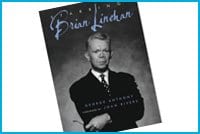Picture this: September 1963, a rented room in Toronto’s Yorkville and a young gay man newly escaped from his gritty Irish-Serbian upbringing in the grim shadow of a Hamilton steel plant. Now flip to the first photos in this fact-crammed if sometimes plodding celebrity bio by entertainment reporter George Anthony. There, circa 1950, a grainy snapshot of a Dofasco tract house and a Serbian mum and step-dad looking like they’re straight off a Vojvodina potato farm — all except for dad’s unaccountable Jack Nicholson shades. Must have been an early omen.
Brian Linehan, CityTV’s gushing, garrulous interviewer of Tinseltown stars and just about everyone else who mattered in the film world, had a run of 15 years (1973 to ’88) on City Lights, the in-depth interview series that made other movie chat shows look like formula flash. Linehan’s fawning before his screen idols was too naked for some, but the storehouse of knowledge he brought to every interview vaulted them completely out of the expected. A master at finding the human truths under the show biz bling, he set a sophisticated standard in entertainment news that has never been rivalled.
But the early life of Brian, immigrant steelworker’s son, unfolded like a kitchen-sink B movie. Father Les was an Irish boozer and wife-beater, his sons destined to a life of sweat and peril in the foundry. Happily, he skipped out when Brian was still a wee lad and mum hooked up with Serbian Jovo.
Linehan knew as a teen that he belonged in a different world. By 19 he was an “executive trainee” for Odeon cinemas in Toronto. Before long he was a “wrangler” for visiting stars. Barely 20, he was handling the likes of Alfred Hitchcock and Joan Crawford on their whirlwind promo trips to Toronto. In 1972 Moses Znaimer jumped ship at the CBC, cobbled together a fledgling TV station and began, on a shoestring budget, to produce programming that turned convention on its head. Linehan joined the team in 1973.
Was there a major film figure Linehan didn’t interview in his 15-year tenure at City Lights? Famed more than anyone before or since for his uncanny skill at calling up more about his subjects’ lives and careers than they recalled themselves, his sessions with celebrities left them gap-jawed. Shirley MacLaine maybe put it most succinctly: Hollywood stars flocked to Toronto, “so Brian could tell us about our lives.” Meanwhile, there was a huge gap between his intimate chats with the glitterati and the closely guarded glitter factor in his own life.
Linehan’s life with Zane Wagman began in the late ’60s in a Toronto diner when he homed in on the dreamboat dentist and asked to share his table. Through the 1970s the pair lived in a series of houses in Toronto, renovating and reselling them. The man he shared his life with was unknown to many friends. Anthony quotes Linehan’s longtime friend (also his lawyer) Michael Levine: “I never had a conversation with Brian, for at least the first 20 years, in which he would ever describe Zane Wagman as his lover, or his partner, or his spouse, or in any other endearing way.” Marilyn Lightstone recalls Wagman and Linehan’s weekend ritual: shopping for groceries and flowers, then a mutual gym session followed by Sunday brunch. But friend after friend noted Wagman’s absence from Linehan’s larger social circuit. Wagman’s ongoing battle with depression was seen as a factor in his reclusiveness, but Linehan also habitually characterized Wagman as just a roommate.
Thirty-five years with Wagman ended in July 2002 in a Helsinki hotel room where Wagman killed himself with painkillers and alcohol while on a solo opera holiday. Only a few months earlier he and Linehan had learned that the “bad cold” Linehan couldn’t shake was the beginnings of a non-Hodgkins lymphoma.
Anthony’s breathless record of career twists, Hollywood press junkets and gin-soaked parties finally earns its page count with the onset of Linehan’s illness. We at last see the real affection underpinning the giddy whirl and petty infighting.
Notorious for his off-camera sulks and “hissy fits” for which he rarely apologized, Linehan was also valued by many as a vibrant (if prickly) friend. Karen Kain, a close friend for decades, said he “maintained our friendship systematically and with care. He was the one who made it work.”
Joan Rivers knew him as “very, very loyal. He would defend you to the death. Which you don’t find at all in our business.” The obsession with celebrity seduced many while alienating others, but all agree Linehan was a riveting party guest. With equal aplomb, he could launch a catfight or have an entire room in stitches.
Linehan died of cancer in 2004, cradled by two close friends in his last moments. His final days, and the deathbed scene itself, bring out the spare, authentic best in Anthony’s writing. The book is finally a touching record of a groundbreaking and uniquely Canadian luminary whose private life fell ever further into shadows and loss.

 Why you can trust Xtra
Why you can trust Xtra


